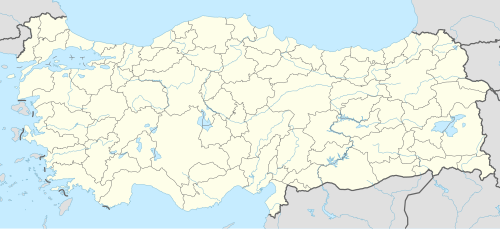Epistle of Ignatius to the Smyrnaeans: Difference between revisions
→See also: update portal line |
Article: add Refimprove notice, Ref. section, auth.control |
||
| Line 1: | Line 1: | ||
{{Refimprove|date=September 2015}} |
|||
The '''Letter to the Smyrnaeans''' (often simply called '''''Smyrnaeans''''') was written by Saint [[Ignatius of Antioch]] around AD 110 to the [[Early Christians]] in [[Smyrna]].{{Cn|date=April 2013}} |
The '''Letter to the Smyrnaeans''' (often simply called '''''Smyrnaeans''''') was written by Saint [[Ignatius of Antioch]] around AD 110 to the [[Early Christians]] in [[Smyrna]].{{Cn|date=April 2013}} |
||
| Line 16: | Line 17: | ||
* [[History of early Christianity]] |
* [[History of early Christianity]] |
||
* [[List of Patriarchs of Antioch]] |
* [[List of Patriarchs of Antioch]] |
||
==References== |
|||
{{reflist}} |
|||
==External links== |
==External links== |
||
| Line 25: | Line 29: | ||
{{Former settlements in Turkey}} |
{{Former settlements in Turkey}} |
||
{{The Lost Books of the Bible and the Forgotten Books of Eden |state=collapsed}} |
{{The Lost Books of the Bible and the Forgotten Books of Eden |state=collapsed}} |
||
{{Authority control}} |
|||
[[Category:Apocryphal epistles]] |
[[Category:Apocryphal epistles]] |
||
[[Category:Ancient Smyrna]] |
[[Category:Ancient Smyrna]] |
||
Revision as of 14:06, 25 September 2015
This article needs additional citations for verification. (September 2015) |
The Letter to the Smyrnaeans (often simply called Smyrnaeans) was written by Saint Ignatius of Antioch around AD 110 to the Early Christians in Smyrna.[citation needed]
Description
It mentions the resurrection of Jesus: (2:1a) "Now, he suffered all these things for our sake, that we might be saved. And he truly suffered, even as he truly raised himself up; not as certain unbelievers say, that he suffered in semblance, they themselves only existing in semblance." The term translated "semblance" is the Greek work "dokein" (δοκεῖν, "to seem") from which the heresy of docetism got its name. The primary purpose of the letter to the Smyrnaeans is to counter those who make the claims of docetism.
To counter the teaching of the docetists, who claimed that Jesus did not come in the flesh, Ignatius wrote the first 7 sections demonstrating the real incarnation of Jesus, thus saying about the Eucharist (7:1) "They [the docetists] abstain from the Eucharist and from prayer, because they confess not the Eucharist to be the flesh of our Saviour Jesus Christ, which suffered for our sins, and which the Father, of His goodness, raised up again. They who deny the gift of God are perishing in their disputes".
The letter is also the earliest recorded evidence of the use of the term "catholic church".
See also
- Christianity in the 1st century
- Christianity in the 2nd century
- Early centers of Christianity
- Early Christianity
- History of early Christianity
- List of Patriarchs of Antioch
References
External links
- Greek text of the Letter to the Smyrnaeans
 Works related to Epistle to the Smyrnaeans at Wikisource
Works related to Epistle to the Smyrnaeans at Wikisource- Online text
Template:The Lost Books of the Bible and the Forgotten Books of Eden

